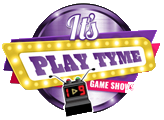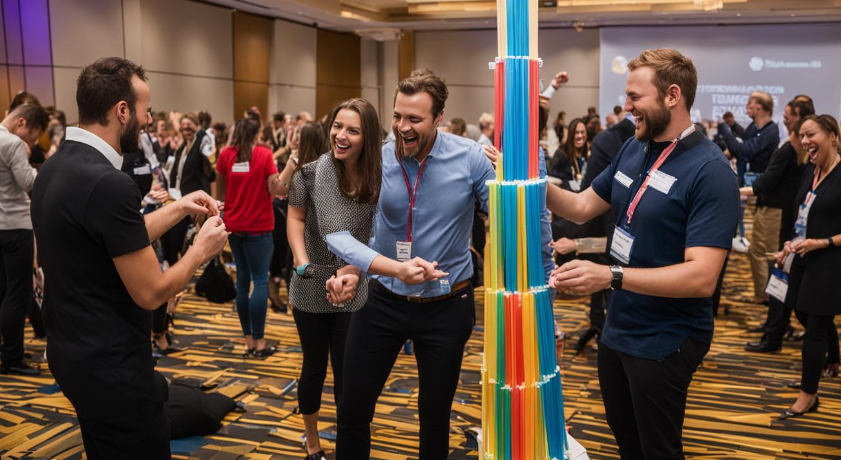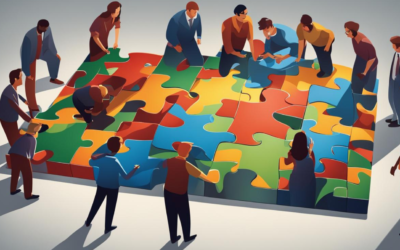Effective workplace collaboration hinges on building strong teams.
If you lead a small group, in-person team building can bring a plethora of benefits to your organization, from improving communication and collaboration to enhancing team spirit.
Team building provide an environment where colleagues learn to work together creating a positive work culture that fosters productivity and cooperation.
Small group team building generates an atmosphere of trust, openness, and mutual respect, which enhances overall team performance.
This article will explore the range of engaging team building activities and strategies tailor-made for small groups to transform your workplace collaboration. Let’s dive in!
Key Takeaways
- In-person team building is an effective way to foster team bonding and enhance workplace collaboration.
- Small group team building generates an atmosphere of trust, openness, and mutual respect, which enhances overall team performance.
- Investing in team building activities can create a positive work culture that fosters productivity and cooperation.
- Effective team building exercises can improve communication and collaboration among team members.
- Customizing team building activities for small groups can create an engaging and impactful experience for all team members.
Building Stronger Connections Through In-Person Team Building

building stronger connections
Small group team building is important to foster effective collaboration and team bonding.
Engaging in team building activities and developing effective strategies can help small groups build stronger connections and achieve better results.
Team building activities come in various forms, such as outdoor adventures, indoor games, and problem-solving exercises that challenge team members to work together towards common goals.
When planning team building activities, it is important to consider the unique characteristics of your group and tailor your approach accordingly.
Effective team building activities should promote communication, enhance problem-solving skills, and increase trust within the group.
One popular activity is called “Word Play,“ where team members must work together to solve a puzzles without going bankrupt.
This activity encourages teamwork, boosts problem-solving skills, and increases communication within the group.
Another effective team building activity is the “Trust Walk,” where team members are paired up, with one person blindfolded, and the other person acting as a guide.
By trusting their guide, the blindfolded person learns to rely on their teammate and enhances their communication skills.
Effective Team Building Exercises for Small Groups
Team building exercises are an essential component for promoting effective collaboration and team bonding within a corporate setting.
To ensure that small groups achieve optimal results, here are some effective team building exercises that you can try out:
| Exercise | Description |
|---|---|
| The Helium Stick | Divide team members into two groups, where they stand in a line with their index fingers outstretched. Position a light, long, and thin stick at shoulder height across their fingers. The challenge is to lower the stick to the ground using their fingers only. This exercise promotes communication, coordination, and teamwork. |
| The Mine Field | Set up an obstacle course in a large empty space using obstacles such as cones and chairs. Working in pairs, one person is blindfolded, while the other person guides them through the “minefield” by giving clear directions. This exercise promotes trust, clear communication, and effective problem-solving. |
| Survival Scavenger Hunt | Create a survival challenge by providing team members with a list of items that they would need to survive in a specific environment. They must source and collect all the items within a given time frame. This exercise promotes creativity, communication, and effective collaboration. |
These team building exercises are not only effective but also fun and interactive, creating a positive and engaging work environment.
Adding these activities into your corporate team building sessions can make all the difference for your small group team bonding efforts.

HR trands in 2023
Looking for team building engagement games, click here.
Benefits of In-Person Team Building Events
Team building events offer numerous benefits to organizations.
By improving team bonding and enhancing workplace collaboration, in-person team building events can increase employee engagement and motivation, leading to improved productivity and overall success.
| Benefit | Description |
|---|---|
| Improved team bonding | By engaging in team building activities, team members can develop stronger bonds and establish deeper connections with one another, which can lead to improved collaboration and communication in the workplace. |
| Enhanced workplace collaboration | Team building events can help break down silos and encourage cross-functional collaboration, improving overall teamwork and efficiency in the workplace. |
| Increased employee engagement | Through fun and engaging activities, in-person team building events can help boost employee morale and motivation, leading to increased engagement and job satisfaction. |
Overall, in-person team building events can have a significant positive impact on workplace culture and team dynamics, ultimately leading to a more productive and successful organization.
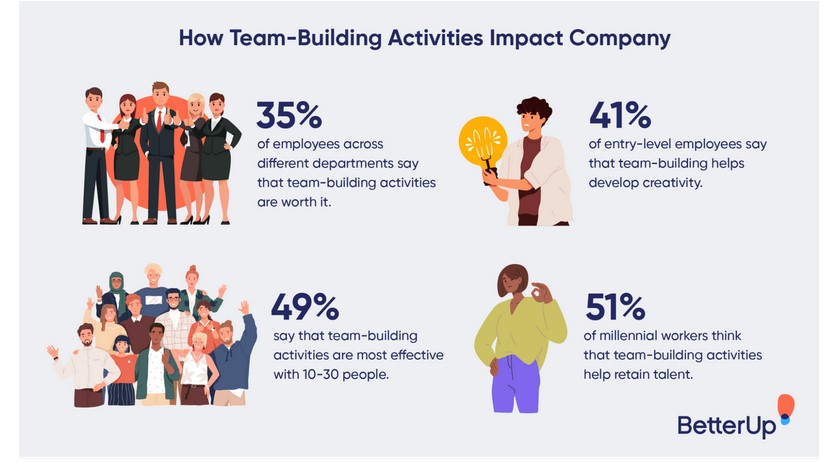
team-building-impact-statistics
Planning Engaging Team Building Workshops
Planning engaging team building workshops is essential for fostering team bonding and creating a positive work environment among small groups.
By tailoring the activities to the specific needs and interests of the team, you can create a memorable and effective team building experience that promotes collaboration and enhances workplace performance.
Identifying Goals and Objectives
Before planning a team building workshop, identifying your goals and objectives is critical. This will help you choose activities that align with your team’s needs and ensure the workshop’s success.
Whether your goal is to improve communication, boost morale, or enhance leadership skills, choosing the right activities is key.
Choosing Appropriate Activities
When planning team building workshops, it is important to choose activities that are appropriate for your small group. Activities that are too challenging or geared towards larger groups can lead to frustration and disengagement.
Consider activities such as scavenger hunts, trivia games, or breakout rooms, which are engaging, fun, and promote teamwork.
Facilitating the Workshop

team-building-facilitation
The success of a team building workshop also depends on effective facilitation. Ensure that team members understand the purpose of the activities, and provide clear instructions to avoid confusion.
Encourage participation from all team members and provide feedback and guidance when necessary. Finally, allow time for reflection and debriefing to reinforce the workshop’s key takeaways.
“Tailoring the activities to the specific needs and interests of the team, you can create a memorable and effective team building experience.”
Team Building on a Regular Basis
Continuing team building beyond the workshop is essential for sustaining the workshop’s impact. Consider implementing regular team building activities, such as group lunches or volunteer events.
These activities can reinforce team bonding and foster a supportive work culture, strengthening relationships and ultimately improving team performance.
Fun and Interactive Team Building Games for Small Groups
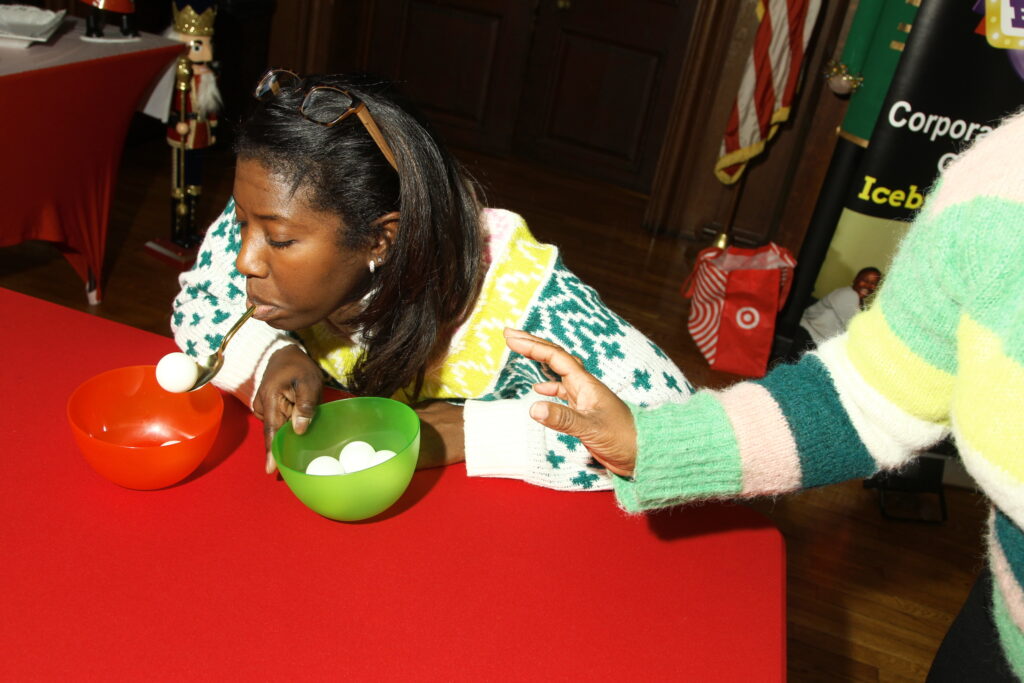
Escape Room Alternative
If you are looking for ways to promote team bonding and improve communication in your small group, trying some fun and interactive team building games can be just the thing you need.
These games create a relaxed, engaging environment where team members can interact and collaborate in a new setting. Here are some great team building games to get started:
| Game Name | Objective |
|---|---|
| Escape Room | Encourage critical thinking, problem-solving, and collaboration as the team works to escape a locked room by solving puzzles and clues. |
| Blind Drawing | Improve communication skills by having team members work in pairs, with one member describing a specific object while the other draws it based on the description. |
| Pictionary | Promote creativity and collaboration as team members work in pairs or small groups to draw and guess words or phrases within a given time frame. |
Incorporating these team building games into your small group can have a big impact on team bonding and improve collaboration in the workplace.
By taking the time to engage in these fun and interactive activities, you can create a more positive work environment and promote a sense of camaraderie among team members.
Customizing Team Building Activities for Small Groups
To maximize the benefits of team building activities, it is important to customize them to suit the unique characteristics and dynamics of small groups. When designing team building activities for small groups, consider the following:
- Group size: Keep in mind that small groups may have different dynamics than large groups. Activities that work well for a large group may not necessarily work for a small one.
- Team goals: Incorporate team goals into the team building activity to help the group work towards a common objective and improve overall team performance.
- Individual strengths: Take into account the personal strengths and weaknesses of each team member and use them to design activities that will help the team work together more effectively.
- Time constraints: Be mindful of the amount of time available for the team building activity and design the activity accordingly.
By customizing team building activities to the needs of small groups, you can create a more engaging and impactful experience that fosters team bonding and improves overall team performance.
Ways to Integrate Team Building into Workplace Culture
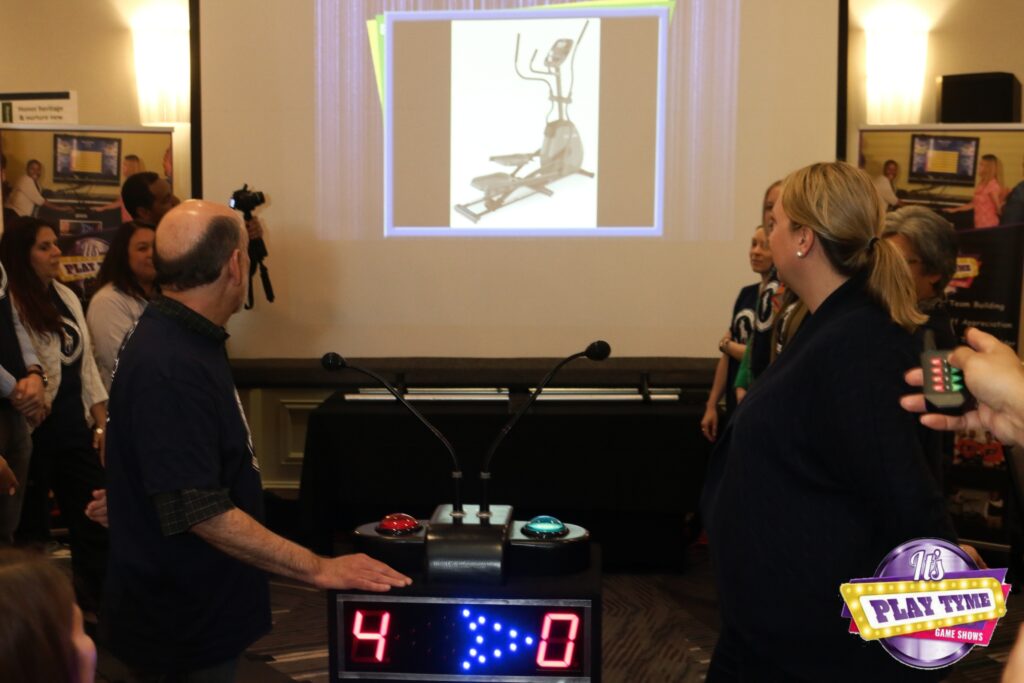
You already know the benefits of team bonding and workplace collaboration. But how do you ensure that this isn’t just a one-time activity?
It’s essential to integrate team building into the workplace culture so that your team feels valued, connected, and engaged. Here are some strategies and best practices to follow:
1. Lead by Example
Start by setting the tone for your team. Every member of the team should be encouraged to participate and engage in team building activities.
As a team leader, it’s your responsibility to be part of these activities too. It shows that you’re invested in the team’s success and are willing to build relationships with your team members.
2. Develop a Customized Program
Each team is unique, so a one-size-fits-all approach won’t work.
Develop a customized team building program that targets your team’s specific needs. It could be anything from scheduled workshops to regular team outings or volunteering activities.
Identify what your team enjoys and what activities promote team bonding best, and integrate them into your workplace culture.
3. Make it a Part of Your Company Culture
Team building should be an integral part of your company culture. It’s not just about building better relationships between teams, but also promoting shared values and goals.
Encourage regular team building events, incorporate it into your mission statement and values, and make it part of your hiring process.
This way, you ensure that team building is considered a crucial part of your organization and is ingrained in your workplace culture.
4. Measure the Success of Team Building
It’s essential to measure the success of your team building program.
Gather feedback from your team through surveys or open discussions to evaluate if it’s helping to improve team bonding and collaboration.
Use the feedback to make changes or improvements. Keep track of these metrics consistently and ensure that your team building program aligns with company goals.
Integrating team building into the workplace culture takes effort.
However, the benefits it provides to your team, such as better team bonding, improved collaboration, and increased employee engagement, make it worth the investment.
Start with these strategies and best practices, and see your team grow and thrive.
Got Games? PRESS PLAY! #boostmorale
![]()
Book a live game show experience today!
Contact us for further details.
We come to your office, venue or off-site location..
For Immediate assistance by text – 917-670-4689
No deposit required. 5-star rated on google.
Measuring the Impact of In-Person Team Building
It is important to measure the impact of in-person team building on team bonding and workplace collaboration to understand its effectiveness and to make informed decisions for future team building events.
Here are some effective measurement and evaluation techniques:
- Surveys: Create a survey with carefully crafted questions to collect feedback from team members about their experience with the team building event. Include questions about team bonding, collaboration, and overall satisfaction.
The data collected from these surveys can help you assess the success of the event. - Observation: Observe the team’s behavior before and after the team building event to understand how the event impacted team collaboration and communication.
Note any changes in the team dynamics and use this information to gauge the success of the event. - Metrics: Define metrics to track the impact of team building activities on workplace collaboration. For instance, create a metric to measure the number of cross-departmental projects initiated after the team building event.
Use this and other metrics to track progress over time and measure the effectiveness of in-person team building.
By using the above techniques, you can effectively evaluate the impact of in-person team building, collaboration, and overall team performance.
It is important to use these insights to continually improve your team building events and create an enjoyable and productive workplace environment.
Overcoming Common Challenges in Small Group Team Building
Small group team building can come with a variety of common challenges that may prevent successful team bonding and collaboration. Here are some strategies to overcome these hurdles:
Challenge 1: Lack of Participation
In some cases, team members may be hesitant to participate in team building exercises, which can negatively impact team bonding.
Encourage participation by making the activities fun and interactive, emphasizing the benefits of improved collaboration and workplace relationships. Also, tailor the activities to the unique interests of each team member to increase engagement.
Challenge 2: Language and Cultural Barriers
Team building activities may present a challenge for teams with members from diverse backgrounds where language and cultural barriers may exist.
Consider activities that do not require significant verbal communication, such as team-based exercises that involve non-verbal cues. Additionally, discuss team member’s preferred languages to arrange accommodations and promote inclusivity.
Challenge 3: Time Constraints
With busy work schedules, team members may find it difficult to set aside time for team building exercises.
Simplify the activities to be accomplished within a reasonable time frame or schedule team building sessions during off-hours. Utilizing virtual team building activities can also help save time and still foster team bonding from any location.
Challenge 4: Poorly Planned Activities
Unplanned or poorly planned team building activities can lead to a lack of engagement and a negative experience.
Be intentional in your planning and incorporate activities that suit the team dynamics. Evaluate what worked well and what didn’t after each session and make necessary adjustments for the next.
Challenge 5: Too Competitive
While team building exercises can be competitive, too much competition can be a challenge.
Instead of focusing on winning, emphasize the importance of collaboration and teamwork. Include neutral games or activities that require group problem solving where no individual is competing against another.
By overcoming these common challenges, your small group team building can become an enjoyable, successful team bonding experience that can positively impact the workplace collaboration.
Looking for team building engagement games, click here.

Game shows for Team Building
Successful Strategies for Sustaining Team Bonding
Creating strong connections among team members through team building workshops is crucial to improving team bonding.
However, it’s equally important to continue building upon these relationships once the initial workshops are over. Here are some effective strategies for sustaining team bonding:
1. Regular Team Building Workshops
Hosting regular team building workshops is an excellent way to continue fostering team bonding.
These workshops can include new activities and strategies designed to enhance communication and collaboration among team members.
By providing ongoing opportunities for team bonding, you can strengthen the relationships among your small group, leading to better workplace collaboration.
2. Encourage Socializing Outside of Work
Encouraging team members to socialize outside of work can also be an effective strategy for building and sustaining team bonding.
This can include informal gatherings or planned team outings and activities.
Team members can develop deeper connections and learn more about each other, by spending time outside of work which leads to a more cohesive and collaborative team.
3. Foster a Supportive Work Culture
Cultivating a supportive work culture can also help to sustain team bonding. This can involve creating an environment where team members feel comfortable sharing ideas, asking for help, and expressing themselves freely.
By promoting a positive work culture, you can ensure that your small group feels valued and engaged, leading to improved team bonding and overall team success.
4. Acknowledge Team Achievements
Recognizing and acknowledging the achievements of your small group can also be an effective strategy for sustaining team bonding.
By highlighting individual and team successes, you can reinforce the importance of collaboration and teamwork, while encouraging your small group to continue working together towards shared goals.
This sense of shared purpose can lead to improved team bonding and a more productive work environment.
Implementing these strategies can help to sustain team bonding beyond the initial team building activities.
By continuing to prioritize team bonding, your small group can build strong relationships and achieve greater success together.
Takeaways: In-Person Team Building for Small Groups
Implementing in-person team building for small groups can have a significant impact on team bonding and workplace collaboration.
By engaging in team building activities, small groups can learn to communicate effectively, identify each other’s strengths and weaknesses, and work together to achieve common goals.
Whether through team building workshops or fun and interactive team building games, small group team building activities can help foster a positive work culture and improve overall team performance.
Remember to customize activities to suit the unique characteristics and dynamics of your small group.
It is also important to sustain team bonding beyond the initial team building activities. Consider incorporating regular team building workshops to continue fostering relationships and promoting communication.
By integrating team building into the workplace culture, you can create an environment that encourages collaboration and supports team bonding.
Assess the impact of in-person team building on your small group’s team bonding and workplace collaboration by using effective measurement and evaluation techniques.
Address common challenges that may arise during team building activities and explore strategies to overcome them, ensuring a successful team bonding experience.
In conclusion, small group team building activities can lead to improved team bonding, enhanced workplace collaboration, and increased employee engagement.
By incorporating these activities into your workplace culture and customizing them to your small group’s needs, you can achieve a more cohesive and productive team.
FAQ – Team Building for Small Groups

frequently asked questions
What is in-person team building for small groups?
In-person team building for small groups refers to interactive activities and exercises specifically designed to enhance team bonding and collaboration within a small group setting.
These activities can take place in a physical location or in a virtual environment where team members can engage with one another face-to-face.
How does in-person team building benefit team bonding?
In-person team building provides an opportunity for team members to interact and engage with each other in a fun and collaborative environment.
It helps build trust, foster better communication, and improve relationships among team members, ultimately strengthening team bonds and enhancing overall teamwork.
What are some examples of team building activities for small groups?
There are various team building activities suitable for small groups, such as problem-solving challenges, trust-building exercises, communication games, and collaborative projects.
These activities encourage team members to work together, develop their skills, and foster a sense of unity within the group.
How can team building exercises benefit corporate teams?
Team building exercises provide corporate teams with an opportunity to build trust, improve communication, and enhance overall collaboration.
These exercises can break down barriers, encourage creativity, and promote a positive and inclusive work culture, leading to increased productivity and employee satisfaction.
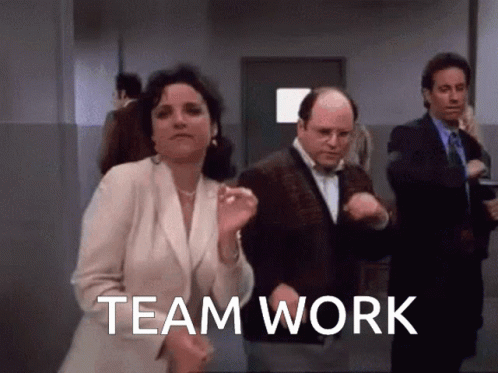
Teamwork Makes The Dream Work
Looking for team building engagement games, click here.
What are the benefits of in-person team building events?
In-person team building events offer numerous benefits for teams, including:
- improved team bonding
- enhanced workplace collaboration
- increased employee engagement
- the development of essential skills such as problem-solving, communication, and leadership.
These events also provide a break from the regular work routine and promote a more positive and motivated work environment.
What are some fun and interactive team building games for small groups?
There are many fun and interactive team building games suitable for small groups, such as scavenger hunts, escape rooms, team trivia, and outdoor adventure activities.
These games encourage collaboration, problem-solving, and friendly competition, fostering team bonding and creating memorable experiences for the participants.
What are some strategies for integrating team building into the workplace culture?
To integrate team building into the workplace culture, start by incorporating team building activities into regular work routines. Encourage open communication, collaboration, and recognition of team achievements.
Provide opportunities for professional development and team building workshops. Foster a supportive and inclusive work environment that values teamwork and encourages employee engagement.
How can I measure the impact of in-person team building on team bonding?
To measure the impact of in-person team building you can utilize various evaluation techniques.
These may include surveys or questionnaires to gauge employee satisfaction and engagement, observation of team dynamics and communication patterns, and tracking of team performance metrics before and after team building activities.
These measures can help assess the effectiveness of team building efforts and identify areas for improvement.
What are some common challenges in small group team building, and how can they be overcome?
Common challenges in small group team building may include resistance to change, lack of participation, and conflicting personalities.
These challenges can be overcome by clearly communicating the purpose and goals of the team building activities.
Creating a safe and inclusive space for team members to express themselves, providing guidance and support throughout the process, and fostering a culture of respect and open-mindedness within the group.
Got Games? PRESS PLAY! #boostmorale
![]()
Book a live game show experience today!
Contact us for further details.
We come to your office, venue or off-site location..
For Immediate assistance by text – 917-670-4689
No deposit required. 5-star rated on google.
